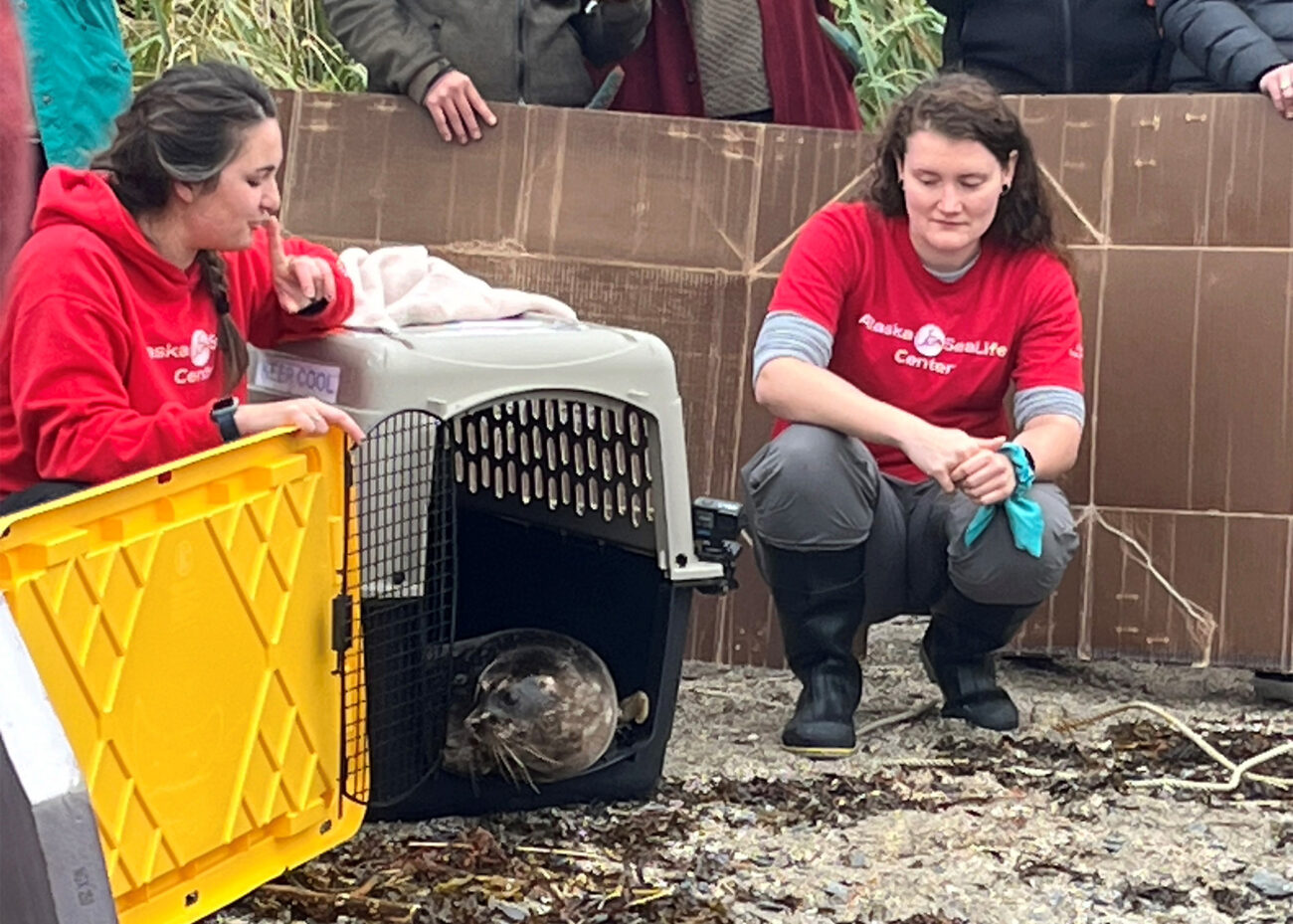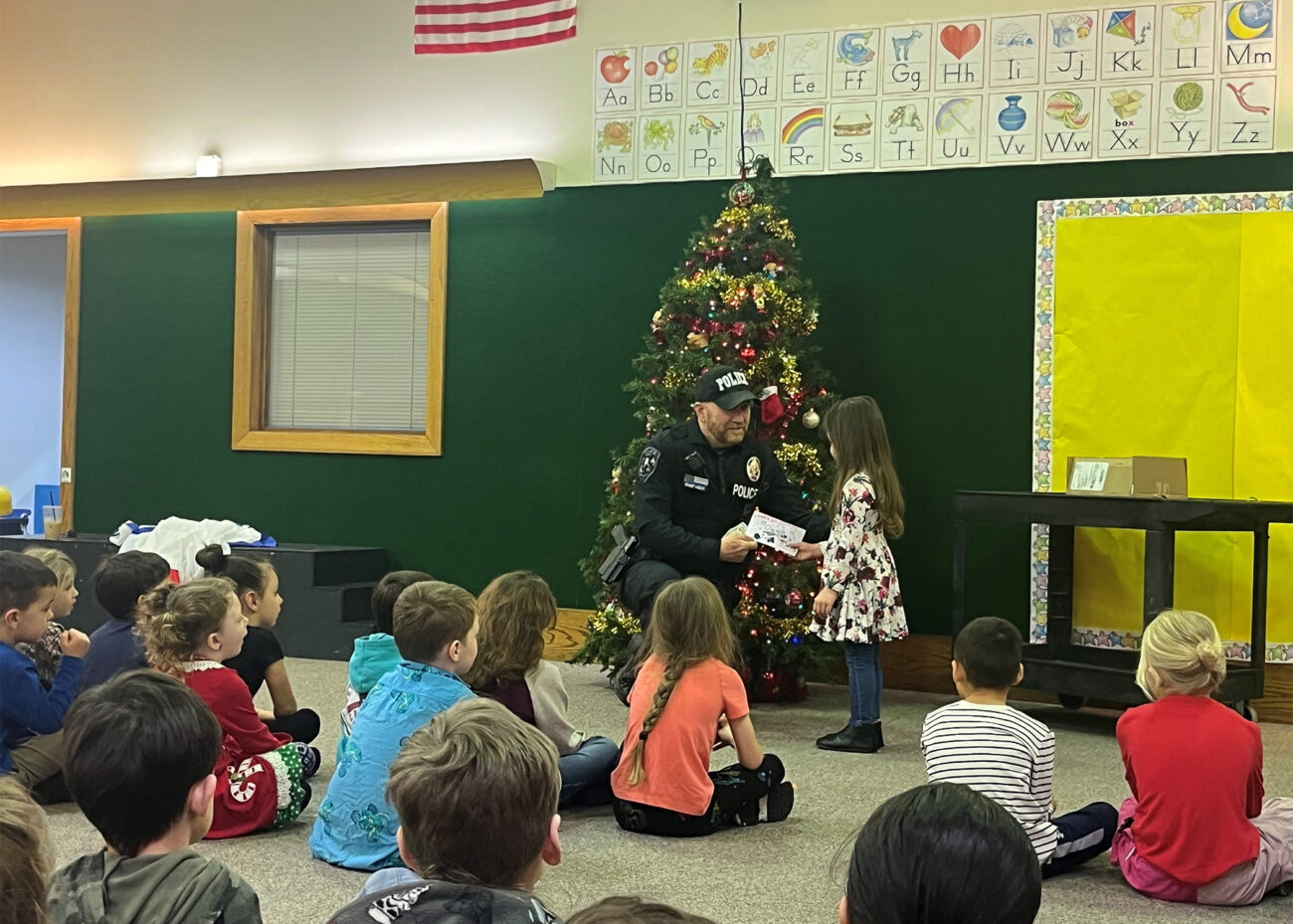
Wrangell was busy this year, in a variety of ways. From providing the nation’s Capitol Christmas Tree, to recreational milestones and federal aid.
Wrangell began the year by coming together as a community and moving forward after 2023’s deadly landslide. One bright spot, Wrangell’s former Alaska State Trooper, Chadd Yoder, received a Trooper of the Year award for the southern detachment. That represents about half the state. His investigations into a commercial crab fisherman who violated parole in 2023 initiated this recognition, and he also received a bravery award for his response during the landslide. This was all a surprise for Yoder, but his family and son, Cyrus, was in on the secret for a while.
“I was so excited for him and they’re finally here,” he said. “I’ve been waiting for so long and then when he finally got it, I was like, ‘You see? That’s what we’ve been all excited about.'”
State troopers took possession of a mountain lion that somebody shot and killed later in the year. This is only the second known mountain lion that someone killed on Wrangell Island. The first was in 1989.
Landslide effects
Another Wrangell citizen was also recognized by the state. Governor Mike Dunleavy honored Wrangell’s Mayor Patty Gilbert at the State of the State for her representation of Wrangell after the landslide. And Gilbert was re-elected mayor during local elections in the fall.
Seeking to better understand natural disasters, state geologists published a landslide report. They found that excessive amounts of rain in a very short time and combined with high winds created unstable conditions that caused the deadly slide.
Shortly after the report’s publishing, the Biden Administration granted Wrangell’s Tribal government, the Wrangell Cooperative Association, $76,979.77 in federal funds. This is only the fourth disaster declaration offered to a tribal nation in the United States. The funds also include payments to replace subsistence food.
November 20th marked one year since the landslide. We heard from a couple Wrangellites who reflected on the year. The landslide significantly impacted both Christina Florschutz, Jamie Roberts and her family. Towards the end of the year, they relocated elsewhere, both starting over, in a way, their new lives. Roberts in Oregon and Florschutz in Kodiak.
Roberts is a swim coach and one of her high school swimmers, Johanna Sanford, reflects on how Roberts played a role in the teenager’s life.

“Jamie is one of the most amazing people I’ve ever met,” Sanford said. “Like genuinely, she’s so kind and just patient, and I’ve never felt as accepted and just as loved by someone who wasn’t like my family before.”
In local government, Wrangell’s Borough Assembly chose interim borough manager, Mason Villarma, to manage the city. Not only did Villarma hold down the city as a temporary replacement, but he also served as finance director. Before his promotion, he helped guide the city through significant events, like the landslide and receiving $5 million in federal funds for Wrangell’s Dam Safety Upgrades project.
In addition, the federal government awarded Wrangell $25 million dollars in the summer, that’s the largest grant Wrangell has ever received. These funds will help rebuild Reliance Harbor. Villarma anticipates that the project will be completed within five years.
Old medical center was almost out of the borough’s hands
And Wrangell nearly sold the old medical center to out- of- state developer Wayne Johnson. That is until the Georgia resident read a headline in the local paper that he said inaccurately accused him of wanting free lots. The Wrangell Sentinel’s publisher, Larry Persily, said the published story was completely accurate.
“So it all changed because of a headline, which I find somewhat a convenient excuse for someone who maybe didn’t want to follow through after all,” Persily said.
The Nolan Center celebrated it’s 20th anniversary in the fall. And unveiled four new repatriated Tlingit objects.
Former collections manager Tyler Eagle said this is part of two dozen objects that were shipped back to Wrangell clans over the last few years.
“These are all fairly old, fairly venerable objects,” he said. “I would hazard to guess that they’re probably around 100 years old each.”
They include a Bear Headdress, a brown tobacco pipe, a Marmot Mask and a Killerwhale Hat.
A few weeks after the unveiling in late spring, around 20 people from Wrangell and Petersburg took off by canoe to head north to Juneau for Celebration. That’s a biennial gathering that honors Southeast Alaska tribes. Close to 10 other yaakw’s – or traditional canoes – from other communities also began the trip in Wrangell. That’s an estimated 70 paddlers total.
During the trip, combat veterans found peace and unity through the journey and others shared stories of how the trip helped them through their healing process. Also, some people unexpectedly met family members for the first time while on the water.
“It’s so, so sad, because that’s our way of life.”
Earlier this year, the Environmental Protection Agency requested Alaska to update fish consumption data among tribes. So the Southeast Alaska Indigenous Transboundary Commission put out a survey for tribal members to get more accurate data.
The data collection effort is aimed at understanding the maximum amount of pollutants in water bodies.
We also learned that up the Stikine River, the Galore Creek Mine in British Columbia, 25 miles from the border, will get a new road funded by the Canadian government. This leaves Wrangell residents concerned, including Christie Jamieson.
“[If] they don’t clean up what they have ruined and they leave it for somebody else, it’s just left behind,” she said. “The land and the beauty and the wildlife and the fish are all gone; and it’s so, so sad, because that’s our way of life.”
One Wrangellite has been trying to change end-of-life services for pets, here on the island. With a rural veterinarian that’s only here for 10 days a month, no one can euthanize pets while he’s gone, leaving pet owners at a significant disadvantage.

And then there was Rocky, one of the many names given to a rescued harbor seal. At four months old in October, she was released back onto Petroglyph Beach, where she originally was found. She galumphed back into her home waters in Southeast Alaska, with more plumpness to her body for surviving the winter.
Recreation in the area
Local hikers are happy that after nearly a decade of planning, the Mt. Dewey Spur Trail opened up in the fall. In Tlingit, the spur trail’s name is Sháchk Kináa Deiyí, which translates to The Path Over the Meadow.
The U.S. Forest Service plans to build seven new cabins in the next couple years, and one of them is in Wrangell. It will be near Long Lake which is in the Southeast part of the island. High School tech students helped map the area with a drone for the cabin placement. Landscape architects are using that footage for designing the new cabin.
The National Forest Foundation and Forest Service rebuilt the Anan Bay cabin. A tree fell on its roof and destroyed it two years ago. In August, Senator Lisa Murkowski visited the spacious cedar cabin on its opening day. She had the honor of cutting the grand ribbon with giant scissors, noting the upgrade.
“None of them ever looked like this,” she said. “They were the places where your family would go, where hunting people would, you know, sometimes somebody got stuck somewhere. They were a refuge in a storm, or they were an opportunity for families to gather.”
The high school tech club, called T3 Alliance, also collaborated with the Forest Service on another project. This time all in the name of bears. They designed and installed live bear cameras at Anan Wildlife Observatory, a well known viewing spot to see both black and brown bears eat salmon. On opening day, during Wrangell’s Bear Fest, bear biologists and a linguist professor visited the area by boat and shared stories of research and Tlingit history.
“So many really good Christmas cards”
High school students tested microplastics in Wrangell’s harbors and won an environmental science and sustainability award. They found that microplastics increased up to 200% in the area since 2023. And some middle school students worked hard at producing 17 documentaries and six podcasts. Their work was shown at the first ever Stikine Stories Film Festival in Wrangell.

The school district and the new police chief, Gene Meek, have been working to keep the schools safer from school shootings.
The chief has been meeting with school staff, getting a sense of how to protect students and staff.
The “perfect” Christmas tree
Meek has been focused on public safety, but he said it’s important to have a little fun and include community involvement. So he set up the first Christmas Card Contest and put up the prize money for it. He visited Evergreen Elementary to announce this year’s winner.
“I got so many really good Christmas cards, so many of them, but we can only have one winner, right? The winner was chosen, and the winner’s in this room today,” he said. “I just want to tell you that everybody who submitted a card, they were spectacular.”
This year’s winner was 5-year old Rory Roher.
The National Forest Service and Washington, D.C. officials searched for the “perfect” Christmas tree to represent the U.S. Capitol and found it in the Tongass. But it took more than just finding a tree. The Forest Service was very busy making ornaments and trying to get other Alaska communities to join in on the fun. They cut down the tree on Zarembo Island near Wrangell in October. They decorated the top half of it and brought it to Wrangell’s Harvest Festival for a Tribal blessing and one last hoorah before driving it across the Lower 48 to D.C.












